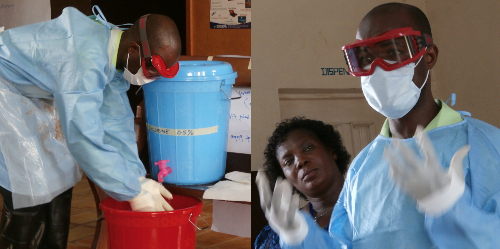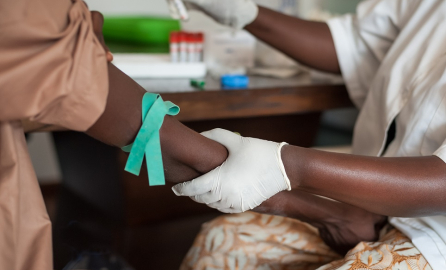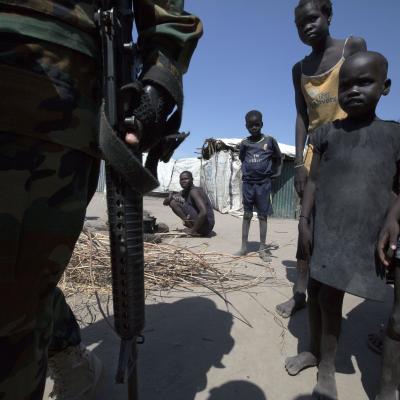In May this year the first case of the Ebola Virus Disease (EVD) was reported in Sierra Leone. Little did we know at that time the major impact this would have on both our programmes and the wider context in which we work. For example, what do you do with your Education programme when schools are closed indefinitely? Renee Zandvliet, from Concern Worldwide, answers this question and others, as she shares her experiences of working in Freetown during this outbreak.
Despite the first EVD case being reported in Guinea two months earlier, the outbreak and the rapid spread of the disease caught the Government and most development partners off guard; with the notable exception of MSF which started ringing alarm bells shortly after the first case in the region was confirmed. When in July the Government declared a State of Emergency, and one airline after the other suspended their flights to Sierra Leone, a significant number of NGOs and companies closed or suspended operations and withdrew their expatriate staff.
|
Concern Worldwide in Sierra Leone Concern Worldwide, an international organisation currently working in 28 countries, started working in Sierra Leone in 1996 (in the midst of the country’s devastating civil war), focusing initially on emergency response and rehabilitation and later on projects in the health, education and livelihoods sectors. Concern then started to move away from sectoral projects primarily focused on a micro level, to an integrated approach which tackles all dimensions of poverty (including lack of or low return on assets, inequality and risk and vulnerability) at a micro, meso and macro level in two parts of the country: the capital Freetown and the surrounding Western Area, and Tonkolili District (a rural district at the heart of the country). |
As of 10th December, the cumulative number of confirmed EVD cases is 6,457 confirmed cases with 1,823 confirmed deaths. Transmission remains intense and widespread, with confirmed cases in all of Sierra Leone’s 11 districts. Denial and misconceptions, insufficient holding and treatment centre capacity, delays in obtaining lab results, and unsafe burial practices remain major challenges.
Fortunately, most organisations that initially suspended projects are now resuming and even scaling up operations. Moreover, the British Government in September announced it would be leading the international response to the EVD in Sierra Leone, which quickly translated into more funding and more people (military personnel and humanitarian staff) on the ground.
Concern’s response to the Ebola outbreak
For Concern Worldwide, as a humanitarian organisation, it is our mandate to respond so – fortunately - suspending operations was never really an option. However, as the situation in the country evolved, so did our Ebola response.
Our response, funded primarily by Irish and UK government funding, is implemented in our existing operational communities of Tonkolili, Freetown and the surrounding Western Area through using our ongoing programmes in Health, Education and Livelihoods as a platform for scaling up.
Initially, in June and July, we focused on sensitisation by supporting the District Health Management Teams (DHMTs) in our areas of operation. This included the reproduction and distribution of information materials and airing of radio jingles on the EVD for hospitals and health centres, as well as the general public. We also donated hygiene items (soap, chlorine, buckets, gloves, etc.) to the Ministry of Health and Sanitation for onward distribution to local health facilities.

Infection Prevention & Control by Concern Worldwide through the DFID-funded Ebola Response Consortium. Kingtom, Freetown, Oct.
As the virus spread from one district to another and the first cases emerged in our operational areas, it became clear there was a need to scale up our response. Our ongoing Health programme, including our relationships with the DHMTs and with community health workers, proved very valuable and allowed us to respond rapidly through:
- training health workers: notably the roll out of Infection Prevention and Control (IPC) training so that staff at local health centres can effectively isolate suspected EVD cases
- support with needed supplies
- but also, for example, through the secondment of Concern staff to the Ebola command centre in Freetown.
The organisation also put in place practical measures to keep staff safe (such as temperature checks and compulsory hand washing).
However, a major restriction on our activities (and that of other actors), was the ban on public gatherings linked to the State of Emergency, declared by President Ernest Bai Koroma on 30th July. Because what do you do with your Education programme when schools are closed indefinitely? Well, you advocate for and work with the Ministry of Education and other partners to develop an ‘Emergency Education Radio Programme’.
Or what do you do with plans for community drama sensitisation on HIV and AIDS when there is a ban on public meetings? You use that funding to support people with HIV. Many are increasingly reluctant to visit health centres to get their monthly supply of antiretroviral drugs out of fear of contracting Ebola or to be quarantined. This problem can be addressed by bringing the drugs to them, along with hygiene items and one-on-one training on how to prevent Ebola infection. And some of our activities, such as the construction of water and sanitation facilities, continued as planned. Fortunately, the donors of our ongoing programmes (including the European Union) have generally shown understanding and flexibility.
|
The EU is currently supporting one of Concern's flagship programmes in the Tonkolili district called "Sustainable Health Action's through People's Empowerment" (SHAPE) with a €950.000 grant. The project aims to contribute to improving the health outcomes of Tonkolili District in line with the poverty reduction strategy paper of Sierra Leone and with the Millennium Development Goals. Specifically, it sets out to improve access to and delivery of health services through strengthening referral systems, empowering communities to monitor quality of services, and capacity development of local authorities in the district. Activities include the rehabilitation of two peripheral health units to Basic Emergency Obstetric and New Born Care (BEMONC) standard, purchasing and operating an ambulance and its referral service, and community outreach and sensitization around child and maternal health issues. |
In recent weeks, as Concern continues to work on preparedness and social awareness raising, we have taken on some new activities related to ‘dead body management’ in Freetown. This includes cemetery management and management of burial teams and burial vehicles; hardly an area of expertise for us as an organisation, but a great need on the ground and one that that matched our vast logistics experience in emergency settings and our commitment to human dignity. In Tonkolili, Concern is supporting the operationalisation of 13 Community Care Centres for people suspected of having Ebola. The centres will be run by the Government of Sierra Leone through their District Health Management Team, with Concern providing training, monitoring and other support (including catering for staff and patients and child protection support).
At the same time, we are starting the development of new, longer term programmes addressing the short and long term needs of the extreme poor in Sierra Leone after the Ebola outbreak. What is clear already is that the Ebola outbreak (and the measures to respond to it such as the closing of schools and the quarantining of districts) are having profound economic, psychological and security implications for the population. Particularly worrying is the increasing fear and reluctance of people, including pregnant women, to seek healthcare for themselves and their children: the implications of the EVD on maternal and child health in Sierra Leone could be catastrophic.
With many businesses closed or scaling down operations and the EVD having a major impact on the country’s still small but growing tourism sector, the World Bank has warned that the economic impacts of Ebola are “already very serious in Sierra Leone and could become catastrophic” if the disease is not quickly contained.
Lessons learnt?
Most stakeholders have agreed that the initial response to the outbreak was (too) slow and that they underestimated the potential scale and impact of the outbreak. Lack of coordination and much needed financial and human resources have been major challenges. We (Concern but also the Government, UN agencies and other local and international NGOs) are still very in much in emergency mode and it is probably too soon for distilling lessons learnt.
What is clear however, is that when the need is huge and there is pressure from the Government, donors or headquarters, it is not always easy to ensure a response is as much based on the needs of people and the situation on the ground, as on your vision, experience and expertise as an organisation and your logistical capacity to respond. What has been really helpful for Concern is a visit by our CEO and other senior staff from our head office, which greatly contributed to making sure we got the resources required to respond effectively and at the same time helped strengthen advocacy internationally.
Our Ebola response also underscored the importance of what is really an organisation’s most valuable resource, especially in difficult times: its staff. Keeping them both safe and informed as the situation evolved, was vital in ensuring we were able to respond effectively.
Finally, this Ebola outbreak in Sierra Leone revealed some of the more structural issues in Sierra Leone - including the deplorable state and thus the vulnerability of the healthcare sector, major challenges linked to illiteracy and the failures of governance such as the widespread distrust of authorities – that will need to be addressed going forward.
This collaborative piece was drafted by Renee Zandvliet with support from the capacity4dev.eu Coordination Team. Photos by Ms Zandvliet © Concern Worldwide. Ms Zandvliet is Programme Quality Manager with Concern Worldwide in Sierra Leone. The views expressed in this article are entirely those of the author and don’t necessarily reflect Concern Worldwide’s view.



Log in with your EU Login account to post or comment on the platform.